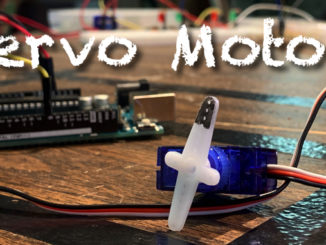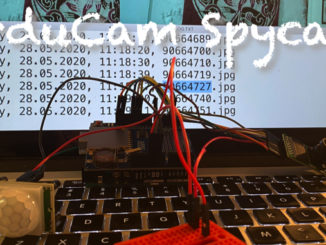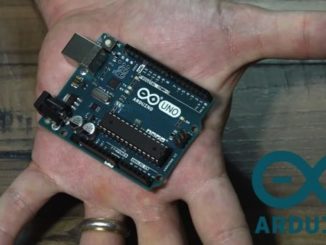This project uses the Adafruit Ultimate GPS Module, an Arduino Uno with WiFi and a 20×4 I2C LCD Screen to display your location in Degrees and show your speed of travel.
Note:
- When I did this project with a standard Arduino Uno the Latitude was off by hundreds of miles, switching to an Arduino Uno with WiFi “magically” fixed the issue.
- Make sure to solder on the battery holder and add the battery to the GPS. Initialization time for GPS goes from minutes without the battery to seconds with it.
- (GPS.latitudeDegrees, 8)
- (GPS.longitudeDegrees, 8)
- In the code I display coordinates in Degrees which is compatible with Google Maps and standard mapping software.
- When modifying Examples by Adafruit look for the ones that say “GPS_SoftwareSerial…”
- Remember that the GPS may not pick up a single inside a building. On my ground floor the GPS works fine, but in my basement lab it receives no signals.
Prerequisite Classes:
Libraries:
- Adafruit GPS – https://github.com/adafruit/Adafruit_GPS
- New Liquid Crystal Library – https://bitbucket.org/fmalpartida/new-liquidcrystal/wiki/Home
- Liquid Crystal I2C Library – https://www.arduinolibraries.info/libraries/liquid-crystal-i2-c
Functional Parts in the Project:
- Arduino WiFi Rev 2 – https://store.arduino.cc/usa/arduino-uno-wifi-rev2
- 20 x 4 I2C LCD Screen – https://amzn.to/2JVuKzn
- 560 Piece Jumper Wire Kit – https://amzn.to/2MsCLjL
- CR1220 Batteries – https://amzn.to/2X6h4ch
- Adafruit Ultimate GPS – https://amzn.to/3gYPrds

//This is a modification of the Example code: GPS_SoftwareSerial_Parsing
//Works well with an Arduino Uno with WiFi Rev2,
//with Arduino Uno I get massive Latitude Issues
#include <Adafruit_GPS.h>
#include <SoftwareSerial.h>
//ETCG Notes - LCD I2C Screen
#include <Wire.h>
#include <LCD.h>
#include <LiquidCrystal_I2C.h>
LiquidCrystal_I2C lcd(0x27,2,1,0,4,5,6,7);
// Connect the GPS Power pin to 5V
// Connect the GPS Ground pin to ground
// Connect the GPS TX (transmit) pin to Digital 8
// Connect the GPS RX (receive) pin to Digital 7
// you can change the pin numbers to match your wiring:
SoftwareSerial mySerial(8, 7);
Adafruit_GPS GPS(&mySerial);
// Set GPSECHO to 'false' to turn off echoing the GPS data to the Serial console
// Set to 'true' if you want to debug and listen to the raw GPS sentences
#define GPSECHO true
void setup()
{
//ETCG Notes - Start LCD
lcd.begin(20,4);
lcd.setBacklightPin(3,POSITIVE);
lcd.setBacklight(HIGH);
lcd.setCursor(0,0);
lcd.print("Arduino GPS");
// connect at 115200 so we can read the GPS fast enough and echo without dropping chars
// also spit it out
Serial.begin(115200);
delay(5000);
Serial.println("Adafruit GPS library basic test!");
// 9600 NMEA is the default baud rate for Adafruit MTK GPS's- some use 4800
GPS.begin(9600);
// uncomment this line to turn on RMC (recommended minimum) and GGA (fix data) including altitude
GPS.sendCommand(PMTK_SET_NMEA_OUTPUT_RMCGGA);
// uncomment this line to turn on only the "minimum recommended" data
//GPS.sendCommand(PMTK_SET_NMEA_OUTPUT_RMCONLY);
// For parsing data, we don't suggest using anything but either RMC only or RMC+GGA since
// the parser doesn't care about other sentences at this time
// Set the update rate
GPS.sendCommand(PMTK_SET_NMEA_UPDATE_1HZ); // 1 Hz update rate
// For the parsing code to work nicely and have time to sort thru the data, and
// print it out we don't suggest using anything higher than 1 Hz
// Request updates on antenna status, comment out to keep quiet
GPS.sendCommand(PGCMD_ANTENNA);
delay(1000);
// Ask for firmware version
mySerial.println(PMTK_Q_RELEASE);
}
uint32_t timer = millis();
void loop() // run over and over again
{
char c = GPS.read();
// if you want to debug, this is a good time to do it!
if ((c) && (GPSECHO))
Serial.write(c);
// if a sentence is received, we can check the checksum, parse it...
if (GPS.newNMEAreceived()) {
// a tricky thing here is if we print the NMEA sentence, or data
// we end up not listening and catching other sentences!
// so be very wary if using OUTPUT_ALLDATA and trytng to print out data
//Serial.println(GPS.lastNMEA()); // this also sets the newNMEAreceived() flag to false
if (!GPS.parse(GPS.lastNMEA())) // this also sets the newNMEAreceived() flag to false
return; // we can fail to parse a sentence in which case we should just wait for another
}
// approximately every 2 seconds or so, print out the current stats
if (millis() - timer > 2000) {
timer = millis(); // reset the timer
Serial.print("\nTime: ");
if (GPS.hour < 10) { Serial.print('0'); }
Serial.print(GPS.hour, DEC); Serial.print(':');
if (GPS.minute < 10) { Serial.print('0'); }
Serial.print(GPS.minute, DEC); Serial.print(':');
if (GPS.seconds < 10) { Serial.print('0'); }
Serial.print(GPS.seconds, DEC); Serial.print('.');
if (GPS.milliseconds < 10) {
Serial.print("00");
} else if (GPS.milliseconds > 9 && GPS.milliseconds < 100) {
Serial.print("0");
}
Serial.println(GPS.milliseconds);
Serial.print("Date: ");
Serial.print(GPS.day, DEC); Serial.print('/');
Serial.print(GPS.month, DEC); Serial.print("/20");
Serial.println(GPS.year, DEC);
Serial.print("Fix: "); Serial.print((int)GPS.fix);
Serial.print(" quality: "); Serial.println((int)GPS.fixquality);
if (GPS.fix) {
Serial.print("Location: ");
Serial.print(GPS.latitude, 8); Serial.print(GPS.lat);
Serial.print(", ");
Serial.print(GPS.longitude, 8); Serial.println(GPS.lon);
//ETCG Notes -- The Following Gives Coordinates in formant you can plug into
//Google Maps (Degrees)
Serial.println("Location in Degrees");
Serial.print(GPS.latitudeDegrees, 8);
Serial.print(", ");
Serial.println(GPS.longitudeDegrees, 8);
Serial.print("Speed (knots): "); Serial.println(GPS.speed);
Serial.print("Angle: "); Serial.println(GPS.angle);
Serial.print("Altitude: "); Serial.println(GPS.altitude);
Serial.print("Satellites: "); Serial.println((int)GPS.satellites);
//ETCG Notes -- Print to LCD Screen
lcd.clear();
lcd.setCursor(0,1);
lcd.print("Spd: ");
lcd.setCursor(5,1);
float mph;
mph = (GPS.speed) * 1.15;
lcd.print(mph);
lcd.setCursor(0,2);
lcd.print("Lat: ");
lcd.setCursor(5,2);
lcd.print(GPS.latitudeDegrees, 8);
lcd.setCursor(0,3);
lcd.print("Lon: ");
lcd.setCursor(5,3);
lcd.print(GPS.longitudeDegrees, 8);
} else {
lcd.clear();
lcd.setCursor(0,1);
lcd.print("No Signal");
}
lcd.setCursor(0,0);
lcd.print("Satellites: ");
lcd.setCursor(12,0);
lcd.print((int)GPS.satellites);
}
}



Be the first to comment